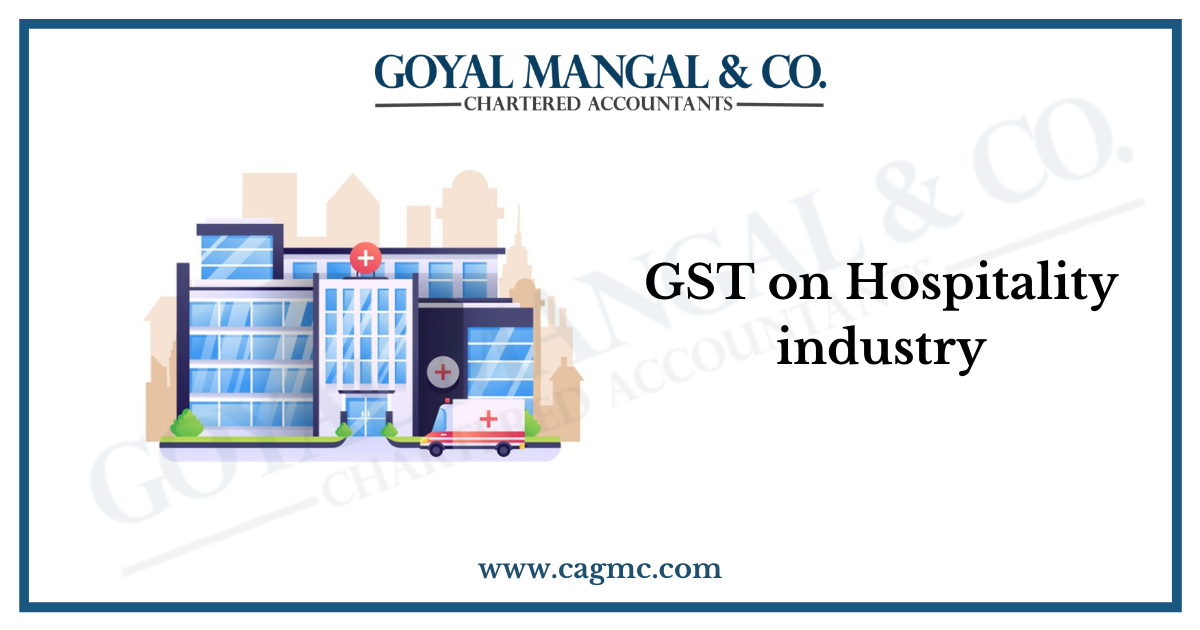| Table of Content |
India’s Goods and Services Tax (GST) has brought a huge impact on the hospitality industry, whether you run a tiny guesthouse or a large luxury hotel. As we discuss about the Hospitality Industry, now a days a number of services are added in the list of services provided by the hotel Industry previously.

Let’s Discuss the services provided by the hotels in today’s era: –
- Accommodation services
- Serving Food in Hotel Restaurant and in hotel room
- Cab services for tourist
- Foreign currency exchange service
- Renting out premises for events
- Food catering services
- Laundry services
- Business support services
- Personal Grooming & wellness services
Applicable GST Rates: –
The GST Council in its 37th GST Council meeting, held on September 20, 2019, has recommended changes in GST rates in respect of hotel and tourism industry. These changes are as follows:
Hotel Accommodation Service-
| Transaction Value per Unit (in Rs) per Day | GST Rate |
| Rs. 1000 and less | Nil |
| Rs. 1001 to Rs. 7500 | 12% with Full ITC |
| Rs. 7501 and above | 18% with Full ITC |
Rates applicable on restaurant business-
| Categories of business | Rate of tax |
| Standalone restaurants | 5% without the benefit of input tax credit |
| Restaurant part of a hotel (where declared takeaway and accommodation charges are not exceeding Rs 7500) | 5% without the benefit of input tax credit |
| Restaurant part of a hotel (where declared takeaway and accommodation charges are exceeding Rs 7500) | 18% with the benefit of input tax credit |
| Regular Catering services on contract basis in office, industrial unit, school, college, hostel etc. | 5% without the benefit of input tax credit |
| Outdoor catering services | 18% with the benefit of input tax credit |
Rent a Cab for Tourists-
In cases where cab services provided by the hotels to their guests there is a option lying with hotel to provide the cab services as complimentary to them just like airport pickups and drop facilities are included in the package provided with the hotels or where cab are provided for the sightseeing of city or for intercity travel then the cab charges are to be paid by the service receivers extra apart from the accommodation charges. Now we have to ascertain the GST rate charged on the bill of cab, In such methodology, since the hotel/restaurant is providing one or more services to the guest as a mixed supply, the taxability of the consideration shall be decided based upon the principles of interpretation as provided in Section 8 of the Central Goods and Services Act, 2017.
Vide sub-section (74) of Section 2, if two or more individual supplies of goods or services, or any combination thereof, made in conjunction with each other by a taxable person for a single price where such supply does not constitute a composite supply then such supply is considered as Mixed and shall be treated as supply of that particular service which attracts the highest rate of tax. In the instant case, the accommodation service assumes the highest rate of GST and accordingly the rate of GST applicable to the accommodation service shall be applied on the entire consideration received from the guest.
- Foreign currency exchange service- 18% GST with Full ITC
- Renting out premises for events-18% GST with Full ITC
- Food catering services-18% GST with Full ITC
- Laundry services-18% GST with Full ITC
- Business support services-18% GST with Full ITC
- Personal Grooming & Wellness Services-18% GST with Full ITC
Hospitality Industry Before GST
Hospitality industry was liable to pay indirect taxes to both Central and State Government under the previous indirect taxation regime. This was just like any other sector in the Indian economy. Understandably, compliance with these was a rather tedious and, in most cases, a costlier process.
The underlying challenge with such a regime was that there were many type of taxes like Excise Duty, Service Tax and VAT. Furthermore, each tax had its respective return and compliance. Moreover, it was not possible to avail input tax credit.
This was because the central taxes could not be set off against state taxes like VAT or vice-versa. Consequently, the cascading effect of the VAT regime where the end consumer paid a tax on tax, increased the end cost.
Hospitality Industry After GST
GST was primarily introduced to standardize tax rates and implement uniform rates on applicable items in a categorized manner. Under GST, the hospitality sector now stands to reap the benefits of such standardized and uniform tax rates, as well as easily and more efficiently utilize Input Tax Credit (ITC). With the implementation of GST, the hospitality and tourism industry in India certainly benefited from the introduction of a single tax regime. Such a tax structure aims to bring uniformity in the indirect tax system along with subsuming multiple taxes. Additionally, services that were earlier taxed separately under the VAT regime (such as the complimentary breakfast), are now taxed as a bundled service under GST.
Further, cascading tax effect is reduced that increased the final cost for the end consumer in the former indirect tax regime.
This means that now hoteliers and restaurant owners would be able to avail and utilize input tax credit in a better way. However, this was not possible under the former indirect tax regime.
Understanding GST Regime with an Example
| Room Details | Pre GST | Post GST |
| Charges Or Tariff | INR 2,000 | INR 2,000 |
| 8% Luxury Charge | INR 160 | – |
| 9% Service Tax | INR 180 | – |
| 12% GST Tax | – | INR 240 |
| Final Amount | INR 2,340 | INR 2,240 |
Impact on Indian Economy-
As an outcome of the lowered costs to end consumers, we can expect an increase in the consumption of services in this industry. At the same time, with compliance and regulatory hurdles easing out, we can hope to see a lower churn and increased profitability for the business owners. Both aspects combined, will result in distinct long-term benefits and possibly result in an increased contribution to the GDP by this sector. GST is a mixed bag of better and easier rules and regulations, and increased costs and compliances.


